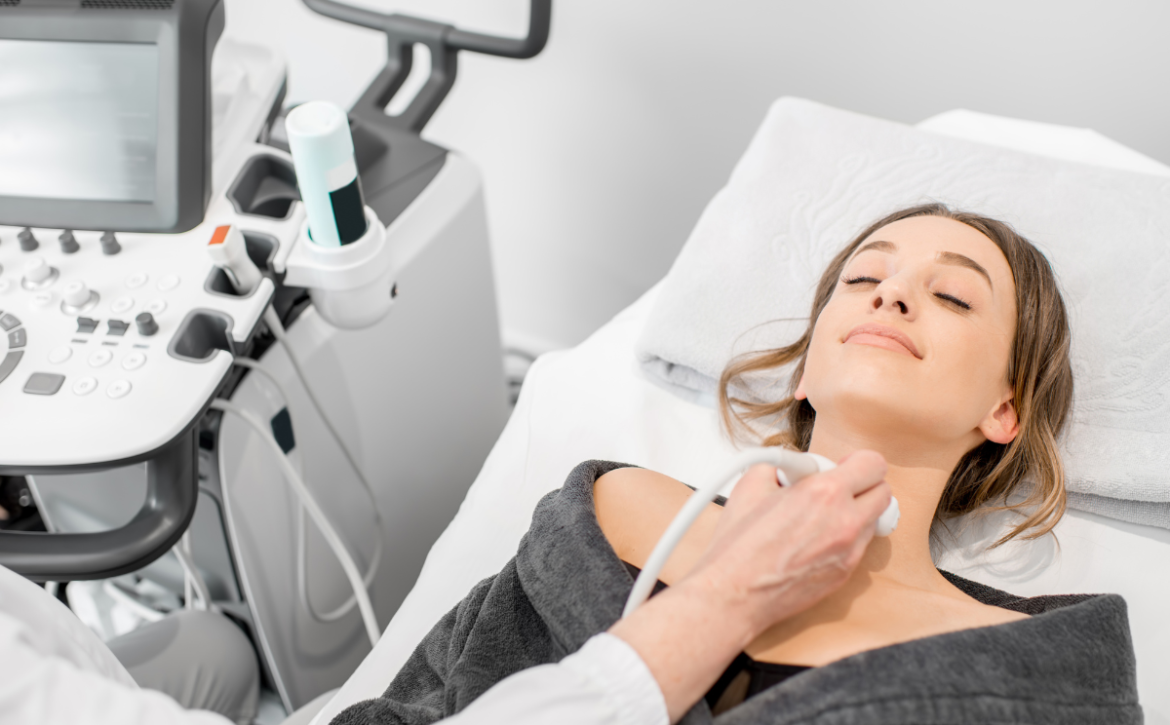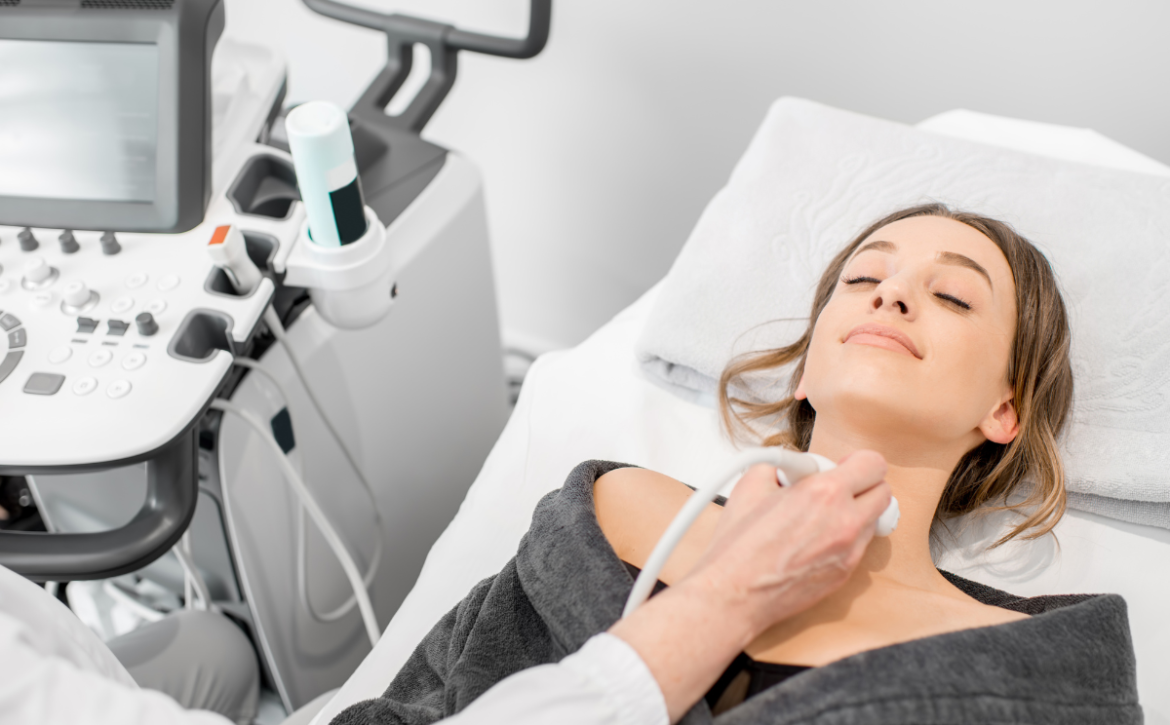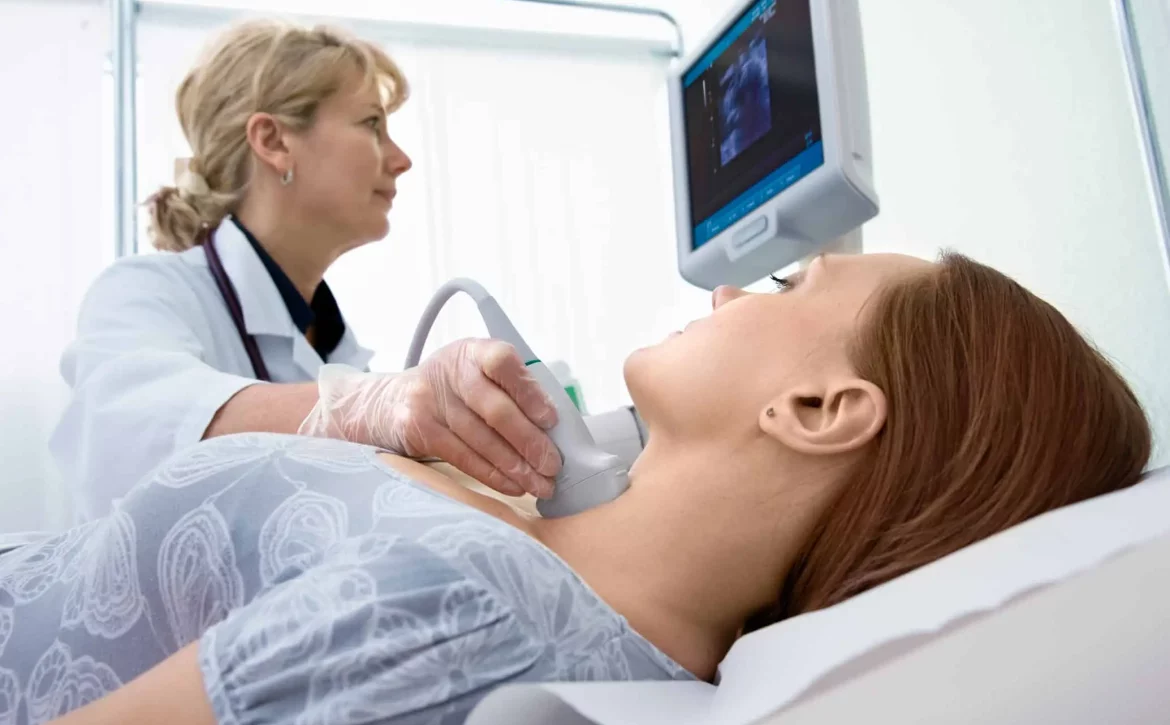Exploring Alternatives: Pros and Cons of Thyroid Ultrasound Scan
Maintaining Thyroid Health
A healthy thyroid gland plays a crucial role in regulating various physiological processes in the body. The thyroid is an endocrine gland located in the neck, and it primarily regulates the body’s metabolism by producing and releasing thyroid hormones, primarily thyroxine (T4) and triiodothyronine (T3).
Maintaining a healthy thyroid can be achieved mostly through a healthy diet and lifestyle, the following provides a summary of the main functions of the thyroid.
Functions the thyroid regulates
Metabolism: Thyroid hormones influence the rate at which the body’s cells use energy. They help control the basal metabolic rate (BMR), which affects how efficiently the body burns calories for energy.
Body temperature: Thyroid hormones help regulate body temperature by influencing heat production and heat dissipation.
Heart rate and cardiovascular function: Thyroid hormones can affect heart rate and the strength of heart contractions. They also help maintain healthy blood pressure.
Growth and development: Thyroid hormones are essential for normal growth and development, especially during childhood and adolescence. They are critical for brain development and bone growth.
Brain function: Thyroid hormones play a role in cognitive function, mood, and overall brain health. Hypothyroidism (underactive thyroid) can lead to symptoms such as depression, fatigue, and cognitive impairment.
Digestive system: Thyroid hormones influence the motility of the digestive tract, affecting how quickly food is processed and eliminated. An imbalance in thyroid function can lead to digestive issues.
Energy levels: Thyroid hormones influence energy production and utilization in the body. Hypothyroidism often leads to fatigue and reduced energy levels, while hyperthyroidism (overactive thyroid) can cause excessive energy and restlessness.
Body weight: Thyroid hormones have a significant impact on body weight and fat metabolism. An underactive thyroid can lead to weight gain, while an overactive thyroid can result in weight loss.
Skin and hair health: Thyroid hormones affect skin and hair quality. Hypothyroidism can lead to dry skin and hair loss, while hyperthyroidism can cause skin thinning and excessive sweating.
Menstrual and reproductive health: Thyroid hormones influence the menstrual cycle in women. Thyroid disorders can lead to irregular periods, fertility issues, and complications during pregnancy.
Cholesterol levels: Thyroid hormones can affect cholesterol metabolism. Hypothyroidism is associated with elevated cholesterol levels, which can increase the risk of heart disease.
Muscle function: Thyroid hormones are essential for normal muscle function, and imbalances can lead to muscle weakness or fatigue.
Pros and Cons of thyroid Ultrasound
When assessing thyroid health, medical professionals often recommend various diagnostic tests. One such test gaining popularity is the thyroid ultrasound scan. In this article, we will explore the pros and cons of thyroid ultrasound scans, shedding light on alternative diagnostic methods and helping you make an informed decision about your thyroid health.
Pros of Thyroid Ultrasound Scan:
Non-invasive and Painless: One of the primary benefits of a thyroid ultrasound scan is that it is a non-invasive procedure. Unlike other thyroid tests, such as biopsies, the ultrasound scan does not require any needles or incisions. It is a painless and comfortable experience for the patient.
Accurate Imaging: Thyroid ultrasound scans provide detailed images of the thyroid gland, allowing medical practitioners to identify any abnormalities accurately. Doctors can analyze the size, texture, and shape of the thyroid gland, making it easier to diagnose conditions like nodules or cysts.
Real-time Assessment: A thyroid ultrasound scan provides real-time imaging, allowing medical professionals to visualize the thyroid gland immediately. This enables them to identify any suspicious growths or abnormalities instantly, facilitating prompt diagnosis and appropriate treatment.
Safe for Pregnant Women: Pregnant women who require thyroid evaluation can opt for a thyroid ultrasound scan without worrying about potential harm to the fetus. Ultrasound scans use sound waves, making them suitable and safe for expectant mothers.
Cost-effective: Compared to other imaging techniques, such as MRI or CT scans, thyroid ultrasound scans are relatively cost-effective. They offer a cost-efficient option for evaluating thyroid health, particularly for individuals with limited financial resources or lack of insurance coverage.
Cons of Thyroid Ultrasound Scan:
Limited Functionality: While thyroid ultrasound scans provide detailed images of the thyroid gland, they have certain limitations. This imaging technique cannot determine the functionality of the thyroid gland or provide information about hormone production. Additional tests, such as blood tests, may be required to assess thyroid function accurately.
Overdiagnosis and Overtreatment: One of the potential drawbacks of thyroid ultrasound scans is the possibility of overdiagnosis and subsequent overtreatment. These scans can identify small nodules or abnormalities that may not necessarily be harmful or require immediate medical intervention. This can lead to unnecessary surgeries or treatments, causing anxiety and potential side effects.
False Positives and False Negatives: Thyroid ultrasound scans are not 100% accurate in diagnosing thyroid conditions. False positives and false negatives can occur, leading to unnecessary worry or missed diagnoses. These inaccuracies can be minimized by relying on expert radiologists or combining ultrasound scans with other diagnostic tests.
Operator Dependence: The accuracy and quality of thyroid ultrasound scans often rely on the expertise and experience of the operator performing the scan. Inexperienced technicians or physicians may misinterpret the images or miss certain abnormalities, potentially leading to diagnostic errors.
Alternative Methods Thyroid Health
Exploring Alternatives:
While thyroid ultrasound scans have their advantages, it is essential to be aware of alternative diagnostic methods for assessing thyroid health. Here are a few alternatives worth considering:
Thyroid Function Tests: Blood tests, such as TSH (thyroid-stimulating hormone) and T4 (thyroxine) levels, can provide valuable insights into thyroid function. These tests evaluate hormone levels and help diagnose conditions like hypothyroidism or hyperthyroidism.
Fine Needle Aspiration (FNA) Biopsy: In cases where the ultrasound scan detects suspicious nodules or growths, a fine needle aspiration biopsy may be performed. FNA biopsy involves extracting cells from the thyroid nodules and analyzing them for signs of cancer or other abnormalities.
Radioactive Iodine Uptake (RAIU) Scan: RAIU scans utilize a small amount of radioactive iodine to assess how the thyroid gland takes up iodine. This test can help diagnose conditions like hyperthyroidism or thyroiditis.
Magnetic Resonance Imaging (MRI) and Computed Tomography (CT) Scans: In certain situations, when more in-depth imaging is required, MRI or CT scans may provide detailed information about the size and structure of the thyroid gland, as well as potential abnormalities.
Thyroid Clinics at LPU.
Thyroid health is vital, and when it comes to diagnostic tests, understanding the pros and cons of each option is crucial. A thyroid ultrasound scan offers non-invasive imaging, accurate visualisation, and real-time assessment of the thyroid gland.
You can book a Thyroid scan with LPU online or opt for a consultation with one of our specialists.






